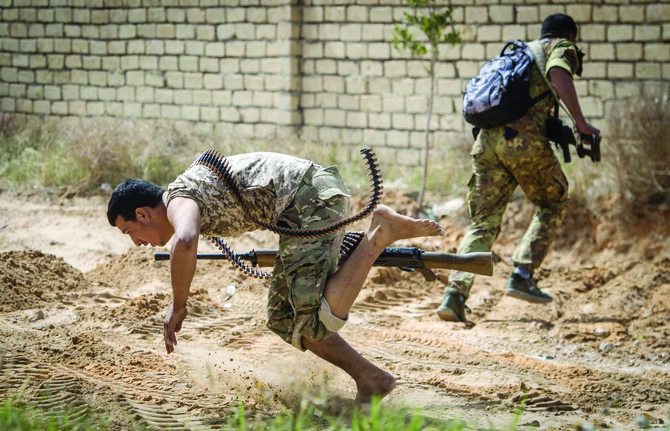
- ARAB NEWS
- 02 Jul 2025

ANKARA: Turkey-backed Syrian rebels will be dispatched to support Libya’s government in its fight against veteran commander Khalifa Haftar, according to press reports.
The fighters have close ties to Turkey and will mainly be those who have fought alongside it in Syria.
Turkish President Recep Tayyip Erdogan said earlier this week that Parliament would vote in early January on a motion to send troops to Libya.
The parliamentary vote is a continuation of Ankara’s recent commitments to support the Tripoli-based Government of National Accord (GNA) through a security and military cooperation deal, and an agreement to delimit maritime borders.
Sultan Murad Division, Suqour Al-Sham Brigades and Faylaq Al-Sham are reported to be among the armed groups destined for Libya, but the Syrian Interim Government has denied any possibility of sending troops who have fought government forces during the civil war.
But deploying fighters from such groups can be done immediately, without the need for a parliamentary green light.
The UK-based Syrian Observatory for Human Rights said Turkey-backed Syrian rebels had opened recruitment centers in Aleppo for dispatching young men to western Libya with a monthly salary of up to $2,000, while Russian media said Turkey had already sent 7,000 fighters to the north African nation.
“If the war’s impact was nightmarish before, it’ll be even worse now if this is confirmed,” tweeted Emadeddin Badi, a Libya analyst with the Middle East Institute. “TFSA/Turkmen Syrian with Sultan Murad have been responsible for some horrendous war crimes against Kurds in Northern Syria (as part of Turkey’s offensive). Their deployment in Libya might halt Haftar’s offensive; but at what price? This was an entirely avoidable outcome.”
There are several risks for a Turkish presence in the region, and not only diplomatic ones. Eastern Libyan forces last week intercepted a Turkish ship bound for the western Libyan port of Misrata.
Sinan Ulgen, a former Turkish diplomat who chairs the Istanbul-based Center for Economics and Foreign Policy Studies, said Turkey was moving to limit potential Turkish casualties.
“The government has declared that the objective of Turkish support will be in an advisory capacity and therefore Turkey does not want to have its troops to be involved directly in the fighting,” he told Arab News. “But given the situation on the ground in Libya, the Tripoli government is under pressure and therefore there is a need for more boots on the ground.
Ankara was calculating that support would be available for Tripoli in the form of some foreign fighters and Turkish personnel as advisers or deployed for targeted special operations, Ulgen added.
“The Turkish move will certainly lead to a new reprisal by the countries supporting Haftar, particularly Egypt. There is a risk that, in reaction to Turkey’s more overt military engagement, other countries will also increase their military support to the Haftar side, and it might be an escalation of the conflict.”
It is unclear how the process of moving Turkey’s Syria assets to Libya will develop in the coming days ahead of a Jan. 8 meeting between Erdogan and Russian President Vladimir Putin.
Russia is against any interference in Libya’s internal affairs by an outsider, the Russian president’s press secretary told reporters earlier this week, although it welcomed attempts to resolve the crisis there.
Ben Fishman, a senior fellow at The Washington Institute for Near East Policy, said it would be a huge mistake to counter one mercenary force with another.
“If Turkey wants to assist the GNA it should do so first with diplomacy and, if necessary, with a contingent of Turkish forces that could serve as a deterrent,” he told Arab News.